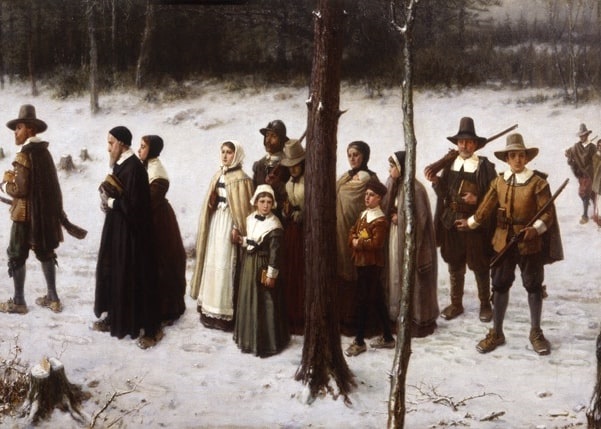Introduction: In this article, Melissa Davenport Berry writes about the discovery of original Puritan court cases from the Massachusetts Bay Colony from 1673 to 1695. Melissa is a genealogist who has a blog, AnceStory Archives, and a Facebook group, New England Family Genealogy and History.
While I was researching the Wardwell family in old newspapers, I stumbled on an interesting find. In 1996 two volumes of 300-year-old court documents from the Massachusetts Bay Colony were discovered by student interns cleaning out file cabinets on the 14th floor of the Suffolk County Courthouse in Boston, Massachusetts.
The two books contained summaries of legal proceedings from 1673 to 1695 which had been transcribed and made available to historians, but the originals apparently had not been seen since 1901.
Richard Lorant of the Associated Press covered the story. He cited a few of the hundreds of cases detailed in the documents: “In addition to charges of witchcraft, adultery and bearing illegitimate children, the two courts handled everything from murder and rape to appeals by sailors looking for back pay.”
The following cases appeared in the article:
- Sarah Wardwell “wickedly, mallitiously, and felloniously” made a covenant with “the Devill” and was convicted of being a witch in 1693.
- Hannah Newell, found guilty of adultery, faced 15 stripes of the lash unless she could come up with the then-considerable sum of 10 pounds.
- Wardwell, a widow from Andover, was found guilty of being baptized by the devil and “becoming a detestable witch”; she was accused of practicing sorcery against Martha Sprague in Salem.
- Newell, who lived in Roxbury in 1693, was accused of committing adultery with Lambert Despar and sentenced “to receive 15 stripes savorally to be laid on upon her naked back at the Comon Whipping post,” plus pay court costs, unless she paid a fine of 10 pounds.
- Hugh Stone of Andover threw himself on the mercy of the court one Christmas Day, pleading guilty to killing his wife. His execution was set for eight days later.
- An American Indian named Zachalenaco, called Zachariah by the court, was convicted and sentenced to hang for stabbing to death a man named Waw-ha-no-naw in 1693.
- Cyprian Southack, commander of the ship Porcupine, appeared in court to request booty from a barque he seized, the St. John Frigott of Quebeck. The court ruled in 1689 that the seizure was legitimate, since England was at war with France, and granted his request.
John Demos, a history professor at Yale University and author of Entertaining Satan: Witchcraft and the Culture of Early New England, told Lorant: “This is ordinary people caught up in all kinds of situations,” and added that “sometimes they even allow you to hear people speak, when they are quoted. That’s unique in 17th-century court material.”
“No one has read completely through them,” stated Christopher Mathias, head of conservation for the Supreme Judicial Court’s Archives and Record Preservation department. The 17th century records were from the Court of Assistants and the Superior Court of Judicature, precursors of the Supreme Judicial Court, the state’s highest tribunal.
According to the article, “Archivists plan to compare the originals against the copies” (transcriptions that were made during the Victorian era). They claimed “some Victorian-era transcribers paraphrased passages they found too racy.”
According to Lorant, “the courts reflected the Puritan sensibilities of the day, in which Scripture weighed heavily on the law. The courts were beginning to change, however. In 1710, the state legislature ordered compensation for some of those accused in the Salem witch trials. The biblical influence would wane for the rest of the century.”
I am not sure how watered down the transcriptions were, but even in their censored condition they aided many writers to create great stories based on Puritan life. Arthur Miller used them to write The Crucible and Nathaniel Hawthorne could not have furnished us with his tales on Salem.
GenealogyBank’s Historical Newspaper Archives are loaded with stories and snippets of court documents. Try a search on your ancestor, as you may find them on either side of the bench!
Stay tuned for court dramas that I will cover in the future. They include gamblers, adulterers, tipplers, wicked wantons, and Sabbath breakers!
